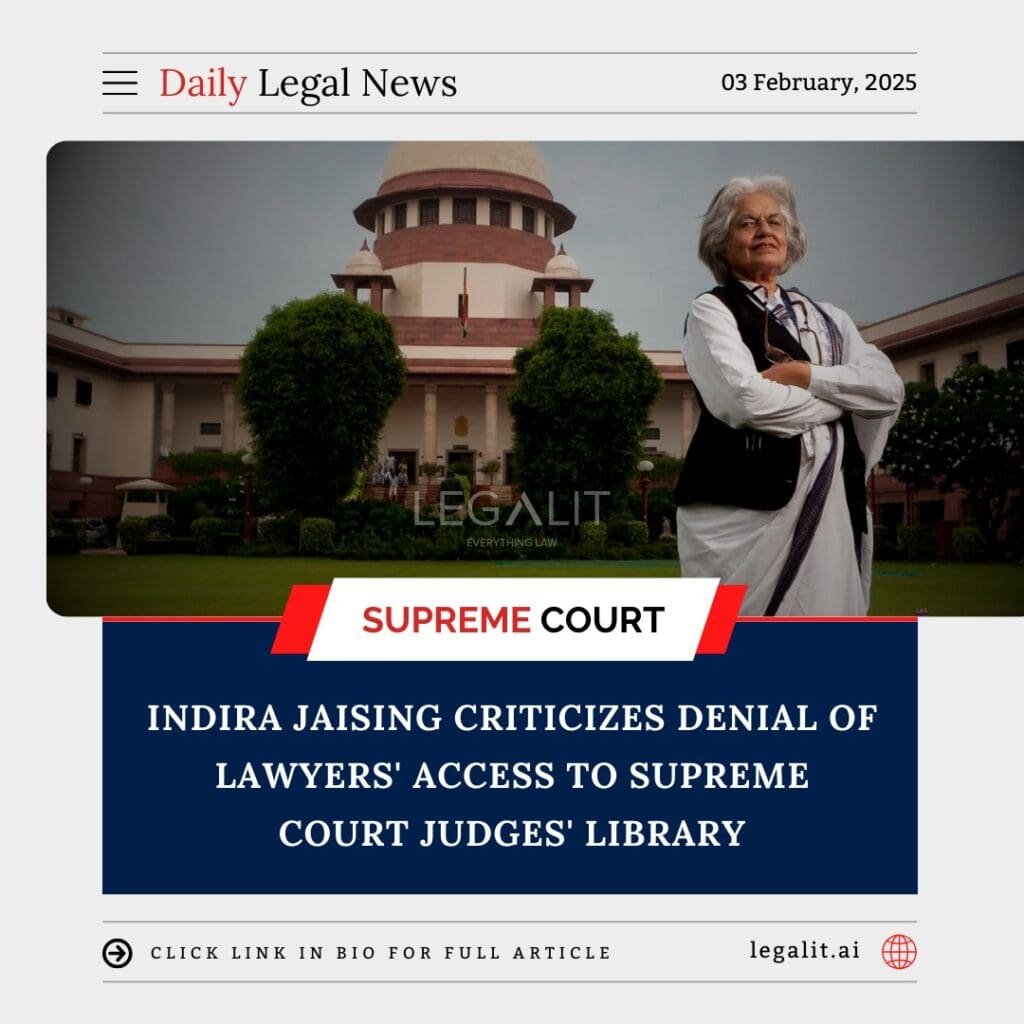
Background
In a strong statement, senior advocate Indira Jaising expressed her disappointment over the recent decision to restrict lawyers’ access to the Supreme Court judges’ library. She termed the move as a direct blow to the fundamental rights of legal professionals and a hindrance to the efficient functioning of the judicial system. The controversy arose when the Supreme Court administration issued a directive preventing advocates from using the library, a facility long available to legal professionals for research and study.
This issue became a matter of public discussion after Jaising’s statement, drawing attention to the growing concerns about the accessibility of vital legal resources for lawyers, especially in the face of rising workloads and the demands of an expanding legal field. The library has traditionally been an important resource for advocates preparing for cases, offering valuable legal materials, references, and research tools that are crucial for ensuring high-quality representation in court.
Jaising’s Statement and Key Concerns
- Unjustified Restrictions:
- Indira Jaising remarked that her requests for access to the library had been dismissed, likening the denial of access to a “dustbin.” She strongly condemned the restriction, highlighting that it undermines the professional rights of advocates and obstructs the smooth functioning of legal work. According to Jaising, such restrictions reflect an alarming trend of diminishing resources available to lawyers, making it difficult for them to carry out their duties effectively.
- Jaising further criticized the approach as being short-sighted, stating that limiting access to crucial legal resources hampers the quality of legal advocacy and delays justice.
- Importance of the Library for Legal Professionals:
- The library at the Supreme Court is a crucial resource for lawyers, providing a vast collection of legal texts, case law, and reference materials. The facility is essential not only for advocates preparing for their cases but also for those involved in research work, drafting legal opinions, and staying updated with legal developments.
- Legal professionals, especially those working in complex cases, rely on such libraries for detailed research and to ensure the accuracy of their arguments before the bench. Without access to such resources, Jaising warned that lawyers would be severely disadvantaged, leading to inefficient legal practices.
- A Blow to Judicial Transparency:
- Jaising raised concerns that restricting access to the library could be part of a larger trend of reducing transparency within the judicial process. She argued that if legal professionals are deprived of critical resources, it could result in the weakening of the relationship between the judiciary and the legal fraternity. In the long run, this would compromise the effectiveness of the judiciary, as lawyers play a crucial role in upholding the principles of justice and accountability.
The Broader Impact of the Restriction
- Challenges for Legal Professionals:
- The restricted access to the library is not just an inconvenience; for many lawyers, it is a practical obstacle that affects their ability to prepare adequately for cases. Legal research is a time-consuming and complex task, requiring access to an array of materials, including legal commentaries, judgments, statutes, and case law. Without this facility, lawyers would have to rely on other methods, which may not be as efficient or reliable.
- For young lawyers and those working on complex matters, the library provides an invaluable resource to gain deeper insights into legal matters and improve their advocacy skills. Its absence would only widen the knowledge gap between experienced and less experienced legal professionals.
- Judicial Independence and Fairness:
- The restriction could also have an indirect impact on judicial independence and fairness, as a lack of proper legal preparation could result in subpar arguments being presented before the judges. It is important that advocates are given every possible tool to present their cases effectively, ensuring that they can challenge or defend legal points in the most competent manner possible. This, in turn, strengthens the justice delivery system by ensuring that judges have access to robust arguments and evidence when making their rulings.
Criticism from Legal Circles
- Opposition from Lawyers’ Associations:
- Legal bodies and associations have expressed their disapproval of the move, calling it counterproductive and detrimental to the rights of legal professionals. Many have pointed out that the restriction disproportionately affects advocates who may not have access to the same resources elsewhere. They argue that the library at the Supreme Court is a shared resource that helps level the playing field, especially for lawyers from smaller firms or those not working with large institutional clients who can afford extensive legal libraries.
- Suggestions for Alternative Solutions:
- Some lawyers have suggested that instead of outright denying access, the court could establish regulated hours or systems to manage the footfall in the library, ensuring that it remains accessible while also maintaining proper usage guidelines. Others have proposed digital solutions, such as offering online access to key legal materials, to balance the need for resource access with concerns of overcrowding.
Conclusion
Indira Jaising’s criticism of the denial of access to the Supreme Court judges’ library underscores the crucial role that legal resources play in the effective functioning of the judiciary. While the administration may have introduced the restriction for operational reasons, it has raised important concerns about the accessibility of resources for lawyers and the potential consequences for the judicial system as a whole. As the legal community continues to voice its opposition, it remains to be seen how the administration will respond to these concerns and whether the access restrictions will be revisited to ensure that the legal profession can continue to function effectively and in the interest of justice.